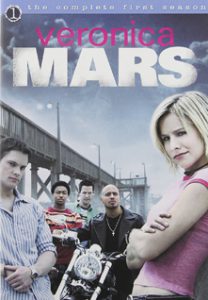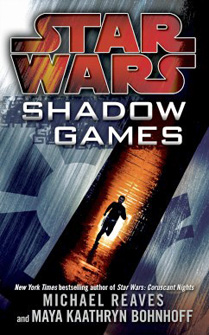Is there a “Star Wars” character that evokes a less passionate response than Dash Rendar? Boba Fett will get a “Love him,” Jar Jar will get a “Hate him,” and heck, even Kitster and Ben Quadinaros have obsessive supporters.
Dash, on the other hand, will get an indifferent “Meh” from most fans. And that’s about right — he’s not the best “Star Wars” character ever, and he’s not the worst. Fans know who he is because he was the major new hero in “Shadows of the Empire,” the much-hyped (and pretty decent) 1996 novel and comic series (and video game and action-figure line, for that matter), but they can’t tell you much about him other than “He’s a smuggler, kind of like Han Solo.”
Part of Dash’s inoffensive blandness comes from the fact that he was created by a committee. “Shadows” filled the gap between “Empire” and “Jedi,” addressing many key plot points, but it couldn’t use Han Solo. Dash calculatedly filled the void; as I recall, when Leia first sees Dash at a distance in the novel, she thinks for a split-second that it’s Han.
And aside from a few cameos and off-the-cuff mentions, “Shadows of the Empire” remained the only story to feature Dash up until “Shadow Games” (November, paperback). The oversight is understandable: If an author needed a Han Solo-type character, they would naturally choose Han Solo. Storytelling generally doesn’t require two characters with the same traits.
But Michael Reaves and Maya Kaathryn Bohnhoff do a decent job of rescuing Dash from obscurity in this pre-“A New Hope” novel where the cash-strapped smuggler and his sidekick, the Nautolan (think Kit Fisto) Eaden Vrill, take a job as bodyguards for Juval Charn, a holostar with a secret. Breaking the standard storytelling rule that contrast — rather than commonality — makes characters pop, the authors also include Han in the story. It sort of works: I like Dash more now that I see how similar he is to Han. And it’s neat to see the smuggler culture enriched through Han’s and Dash’s conversations and rivalry/almost-friendship, along with the comfortably familiar Mos Eisley cantina setting.
“Shadow Games” is by no means an essential “Star Wars” novel, and I admit that I struggled with it at times. Initially, the plot operates sort of like “Clue” on a spaceship — who is the saboteur among Juval’s large entourage? But some set pieces are overly convoluted (I had trouble visualizing some action sequences) and we aren’t given a fair chance to guess the surprises (including a big one that changes the nature of what we’re reading).
Reaves did better work with his Jax Pavan/I-Five novels (“Darth Maul: Shadow Hunter,” the two “MedStar” novels with Steve Perry, and the “Coruscant Nights” trilogy). There’s a great sense of camaraderie among the desperate and disparate characters in those novels. “Shadow Games” tries for that vibe, but there’s just a bit too much mistrust and — due to the secretive nature of Juval and her crew — not enough characterization.

Reaves is such a proven character writer that I’m tempted to blame Bohnhoff for the book’s flaws while giving Reaves credit for what works. That’s probably unfair. Maybe this is just a rare misfire in Reaves’ oeuvre.
All that having been said, “Shadow Games” succeeds in making Dash a relevant character again, and I wouldn’t mind if he popped up in a sequel with Juval and some of her gang, or in another adventure with Han. Also, there’s a nice twist involving Dash’s droid Leebo that fits with Reeves’ established interest in droid intelligence; that could be explored further.
Kind of like the character of Dash Rendar, “Shadow Games” isn’t crucial for casual fans. But it’s not a total waste of time either.
Comments
![]() I picked this up in a used bookshop a few months ago and having read it and being a fan of your reviews I thought I’d check to see what you said about this book.
I picked this up in a used bookshop a few months ago and having read it and being a fan of your reviews I thought I’d check to see what you said about this book.
Ultimately I was a bit disappointed. I like the ‘Coruscant Nights’ books, but this felt like a bit of a retread in some ways (Leebo is a bit too much like I-Five – how many ridiculously capable wisecracking droids are there anyway?). It seemed like Dash was a bit too slow on the uptake a lot of the time. Also there are weird sloppy issues like a mention of Ewoks long before the Battle of Endor or a description of Bestine as a bustling metropolis that was the largest city on Tatooine when other, admittedly older, sources have it as little more than a small hamlet.
My biggest problem was with Juval though and that sort of fits in with your mention of the camaraderie that doesn’t quite feel earned. I think Michael Reaves and Maya Kaathryn Bohnhoff might have originally planned to make her a more morally ambiguous character like a film noir femme fatale but changed there minds somewhere. So you have a character we are meant to see as sympathetic and whom Dash forgives almost instantly who still does some pretty manipulative things.# Posted By Ross Nolan | 8/29/17 9:55 PM
![]() It strikes me that Reaves’ books contain more errors — in terms of copy editing, wider continuity, and continuity within the book itself — than those of most other authors. (Still, I mostly enjoy his work.) Mentioning Ewoks before the Battle of Endor is particularly egregious. Furthermore, it always bugs me a little bit when Ewoks or banthas or Jawas or tauntauns are casually mentioned, as it shrinks the galaxy somewhat. The details of Hoth shouldn’t be known except by the Rebels who were stationed there. Tatooine should be a backwater planet, and as such only someone from there, or whose job takes them there, should know details about it. And so forth. I don’t remember much about “Shadow Games,” but I do recall that it felt particularly rushed and uneven.# Posted By John Hansen | 8/30/17 12:40 AM
It strikes me that Reaves’ books contain more errors — in terms of copy editing, wider continuity, and continuity within the book itself — than those of most other authors. (Still, I mostly enjoy his work.) Mentioning Ewoks before the Battle of Endor is particularly egregious. Furthermore, it always bugs me a little bit when Ewoks or banthas or Jawas or tauntauns are casually mentioned, as it shrinks the galaxy somewhat. The details of Hoth shouldn’t be known except by the Rebels who were stationed there. Tatooine should be a backwater planet, and as such only someone from there, or whose job takes them there, should know details about it. And so forth. I don’t remember much about “Shadow Games,” but I do recall that it felt particularly rushed and uneven.# Posted By John Hansen | 8/30/17 12:40 AM

